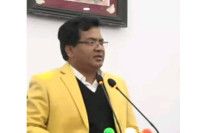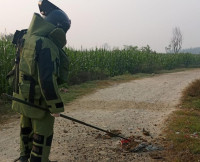National
Government set to relax party split rules
A faction with 40 percent support in either parliamentary party or central committee can launch a new party.
Binod Ghimire
The government is preparing to revise the Political Parties Act to ease the conditions for splitting a political party.
On Friday, the government wrote to the Parliament Secretariat that it wants to withdraw the bill to amend the Act that is under consideration in the House of Representatives. The bill was supposed to be discussed in the House of Representatives on Thursday, but it couldn’t happen following the obstruction from the Nepali Congress.
The very next day, the government wrote to the secretariat for the withdrawal. “We decided to withdraw the bill because we have realised that some changes are necessary on it,” Padam Giri, minister for law, justice and parliamentary affairs, told the Post. “The decision was reached after an agreement among the ruling parties.”
Since the bill was presented in the lower house by then Deputy Prime Minister and Minister for Home Affairs Narayan Kaji Shrestha on February 2, it is now the property of Parliament. “It can be withdrawn only if the lower house endorses the withdrawal proposal,” Ek Ram Giri, spokesman of the Parliament Secretariat, told the Post.
Both the Houses of the federal parliament have become non-functional due to protests by the main opposition. It has been demanding the formation of a parliamentary panel to investigate the embezzlement of funds of four cooperatives that invested in the now defunct Gorkha Media Network, where Deputy Prime Minister and Minister for Home Affairs Rabi Lamichhane was the executive director. While the opposition has been insisting on a committee to specifically investigate Lamichhane, the ruling parties are calling for a broader inquiry into the issues affecting the entire cooperatives sector. Withdrawal of the bill, therefore, is not possible as long as the obstruction continues.
The bill in Parliament aims to reinstate some of the provisions in the Act that became void after the ordinance to revise the Act was repealed three years ago.
On August 18, 2021, the then Sher Bahadur Deuba government had issued an ordinance to amend the Act to ease the split of two parties—the CPN-UML and the Janata Samajbadi Party Nepal.
The ordinance revised a provision in the Act that previously required the support of 40 percent of members in both the parliamentary party and the central committee to split a party. The ordinance lowered the bar to 20 percent in any one of the committees.
On August 26 that year, Madhav Kumar Nepal of the UML and Mahantha Thakur of the Janata Samajbadi registered new parties—the CPN (Unified Socialist) and the Loktantrik Samajbadi Party, respectively.
Two days later, the ordinance was repealed, having served its purpose. The provisions amended by the ordinance have become void after it was repealed. Three months ago, in February, a bill to reactivate those provisions of the Act was registered in Parliament which the government wants to withdraw now.
The existing bill proposes restoring the earlier provision to have a minimum of having at least 40 percent support in both the parliamentary party and the central committee to split the party.
Now, the government wants to lower the bar by introducing a new bill.
“Instead of a minimum requirement of 40 percent in the parliamentary party and the central committee, a new bill could allow a split with 40 percent support in either of the committees,” said a leader from ruling CPN-UML.
The Ashok Rai faction of the Janata Samajbadi Party-Nepal on May 5 split the party and launched a new Janata Samajbadi Party. As there are no legal provisions in the Political Parties Act relating to the formation of a new party after a split in an existing one, the commission registered the new party as per the regulations on political parties.
Upendra Yadav, chairperson of the JSPN, has challenged the commission’s decision in the Supreme Court.
Political experts say the act of tweaking the Act to suit the interest of some parties is a very irresponsible act. They say the parties that should be discussing the issue of national interest as the country is facing an intense economic crisis are happy playing petty party politics. "This is an example that our parties can stoop to any low for their interest. Their one and only focus is to stay in power by any means," Sanjeev Humagain, who teaches political science in Tribhuvan University, told the Post.




 10.04°C Kathmandu
10.04°C Kathmandu















